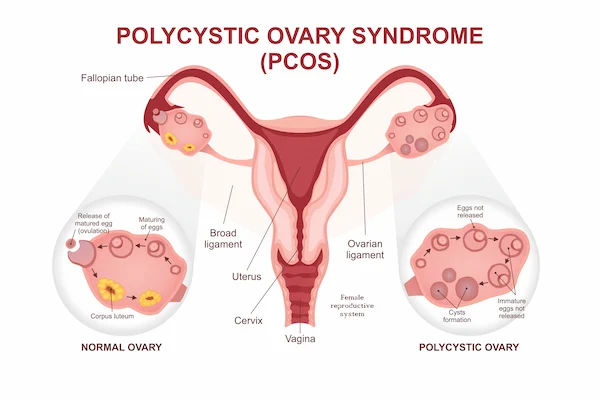Guide to Menstrual Health And Hygiene
Understand the essentials of menstrual health and hygiene, including cycle care, safe practices, and common issues. Learn tips to maintain hygiene and manage periods comfortably and confidently.

Written by Dr. Rohinipriyanka Pondugula
Reviewed by Dr. Siri Nallapu MBBS
Last updated on 13th Jan, 2026

Menstruation is a natural and healthy part of life for half the world's population, yet it's often shrouded in silence, stigma, and misinformation. Proper menstrual health and hygiene are fundamental to a person's well-being, dignity, and ability to thrive. This guide goes beyond the basics to empower you with comprehensive knowledge about your body. We'll demystify the menstrual cycle, explore the vast array of period product choices, and provide practical tips for managing symptoms and maintaining impeccable hygiene. Whether you're seeking to understand your body better, find more sustainable options, or learn how to tackle period pain, this article is your trusted resource for navigating every aspect of your cycle with confidence and ease.
Understanding Your Menstrual Cycle
Your period is just one phase of a complex, monthly cycle orchestrated by hormones. Understanding this cycle is the first step toward optimal menstrual health. The average cycle lasts 28 days, but anything between 21 and 35 days is considered normal.
The Four Phases: Menstrual, Follicular, Ovulation, Luteal
The cycle is divided into four key phases:
1. Menstrual Phase (Days 1-5): This is when you bleed. The uterus sheds its lining because pregnancy hasn't occurred.
2. Follicular Phase (Days 1-13): This phase overlaps with your period. The pituitary gland releases Follicle-Stimulating Hormone (FSH), stimulating the ovaries to produce follicles. One will mature into an egg.
3. Ovulation (Around Day 14): A surge in Luteinizing Hormone (LH) causes the ovary to release the mature egg. This is your most fertile window.
4. Luteal Phase (Days 15-28): After releasing the egg, the follicle transforms into the corpus luteum, releasing progesterone to thicken the uterine lining in preparation for a potential pregnancy. If pregnancy doesn't occur, hormone levels drop, and the cycle begins again with menstruation.
What's a "Normal" Cycle?
A "normal" cycle is unique to you. Tracking your cycle using an app or a calendar can help you identify your personal patterns, predict ovulation, and recognise any concerning changes. Variability in cycle length, especially for teenagers and those approaching perimenopause, is common. However, consistently very short or very long cycles can be a sign of underlying hormonal imbalances.
Choosing the Right Menstrual Product for You
The market for menstrual products has expanded dramatically, offering choices for every flow, lifestyle, and value system. The right product is one that you find comfortable, reliable, and safe.
- Disposable Options: Pads and Tampons
- Sanitary Pads/Napkins: These are worn inside the underwear and absorb flow externally. They come in various sizes, absorbencies (for light to heavy flow), and with or without wings.
- * Pros: Easy to use, no internal insertion, widely available.
- * Cons: Can feel bulky, may cause chafing, generate waste, not ideal for swimming.
- Tampons: Absorbent cylinders inserted into the vagina to absorb flow internally. Crucially, they must be changed every 4-8 hours to minimise the risk of Toxic Shock Syndrome (TSS).
- * Pros: Discreet, allow for swimming and physical activity, no external bulk.
- * Cons: Learning curve for insertion, TSS risk if left in too long, not eco-friendly.
Reusable Revolution: Menstrual Cups and Discs
Menstrual Cups: Flexible, medical-grade silicone or rubber cups inserted into the vagina to collect rather than absorb flow. They can be worn for up to 12 hours and are reusable for years.
- * Pros: Eco-friendly (minimal waste), cost-effective long-term, hold more fluid than tampons, can be worn during most activities.
- * Cons: Requires comfort with insertion and removal, cleaning and sterilisation needed between cycles.
Menstrual Discs: Similar to cups but sit differently in the vaginal fornix. Some disposable versions exist, but reusable silicone discs are also available.
- * Pros: Can often be worn during intercourse (depending on the type), high capacity.
- * Cons: Can be messier to remove than cups.
Modern Alternatives: Period Panties and Reusable Pads
Period Underwear: Absorbent, leak-proof underwear designed to be worn alone or as a backup. They come in various styles and absorbencies.
* Pros: Extremely comfortable, zero-waste, no insertion required, great for overnight use or light flow days.
* Cons: Requires washing after each use, may not be sufficient for very heavy flow alone.
- Reusable Cloth Pads: Washable fabric pads with absorbent layers. They function like disposable pads but are made from materials like cotton or bamboo.
* Pros: Eco-friendly, cost-effective, often softer and less irritating than plastic disposable pads.
* Cons: Requires cleaning and storage of used pads.
Consult Top Specialists
Essential Menstrual Hygiene Practices
Good hygiene is critical to preventing infections and staying comfortable during your period.
How Often Should You Change Your Menstrual Product?
This depends on your flow and the product:
- Pads: Change every 4-6 hours, or more frequently if heavy.
- Tampons: Change every 4-8 hours. Never wear a tampon for more than 8 hours.
- Menstrual Cups/Discs: Can be worn for up to 12 hours, but empty more often if flow is heavy.
- Period Panties: Change as needed, typically every 8-12 hours.
- Intimate Hygiene: Washing and Avoiding Infections
Wash the external genital area (vulva) with warm water and a mild, unscented soap. Avoid douches or scented sprays, as they can disrupt the natural pH balance and lead to infections like Bacterial Vaginosis. Always wipe from front to back after using the toilet to prevent transferring bacteria.
Proper Disposal of Menstrual Waste
Wrap used pads and tampons in toilet paper or the wrapper of a new pad before disposing of them in a bin. Do not flush them down the toilet, as they cause blockages. Many public restrooms have specific sanitary disposal bins.
Managing Period Symptoms and Discomfort
For many, periods come with uncomfortable symptoms. Here’s how to find relief:
Easing Menstrual Cramps (Dysmenorrhea) Naturally
- Heat: A heating pad or hot water bottle on your lower abdomen can work wonders to relax muscles and ease cramping.
- Gentle Exercise: Light activities like walking, yoga, or stretching can increase blood flow and release endorphins, your body's natural painkillers.
- Hydration: Drinking plenty of water can reduce bloating.
- Navigating PMS: Diet, Exercise, and Lifestyle Tweaks
Premenstrual Syndrome (PMS) includes symptoms like mood swings, bloating, and fatigue. Reducing salt, caffeine, and sugar intake in the week before your period can help manage these. Regular exercise and stress-reduction techniques like meditation are also highly effective.
When Over-the-Counter Pain Relief Can Help?
Nonsteroidal anti-inflammatory drugs (NSAIDs) like ibuprofen or naproxen are effective for managing period pain. They work by reducing the production of prostaglandins, the chemicals that cause uterine contractions and pain. It's best to take them at the first sign of cramps.
When to Consult a Doctor?
While some discomfort is normal, certain symptoms warrant medical attention. If your condition does not improve after trying these methods, book a physical visit to a doctor with Apollo24|7 for further evaluation.
- Signs of Irregular Periods and Underlying Conditions
- Consult a healthcare professional if you experience:
- Periods that suddenly stop for 90 days or more (and you're not pregnant).
- Extremely heavy bleeding (soaking through a pad/tampon every hour for several hours).
- Severe pain that prevents you from going to school or work.
- Bleeding between periods or after sex.
- Periods that are consistently less than 21 days or more than 35 days apart.
- These could be signs of conditions like PCOS, endometriosis, fibroids, or thyroid disorders.
Understanding Toxic Shock Syndrome (TSS)
TSS is a rare but life-threatening bacterial infection associated with prolonged tampon use. Symptoms include sudden high fever, rash, vomiting, and dizziness. If you use tampons and experience these symptoms, remove the tampon and seek emergency medical care immediately.
Periods are not just physical; they affect mental and emotional health too. The stigma surrounding menstruation can lead to shame and anxiety. Open conversations with friends, family, and partners are vital. Normalising this biological process empowers everyone to seek the care and support they need without embarrassment.
Conclusion
Navigating menstrual health and hygiene is a journey of understanding and listening to your body. By equipping yourself with accurate information, you can make empowered choices about products, manage symptoms effectively, and practice hygiene that keeps you healthy and confident. Remember, your period is a sign of a healthy, functioning body—not something to be hidden or endured in silence. If you ever have concerns that go beyond typical period discomfort, don't hesitate to seek professional advice. If symptoms persist beyond two weeks, consult a doctor online with Apollo24|7 for further evaluation. Let's continue to break the taboo and embrace period positivity for ourselves and future generations.
Consult Top Specialists
Consult Top Specialists

Dr Lekha K L
Obstetrician and Gynaecologist
15 Years • MBBS,DGO & DNB in Obstetrics and Gynecology
Angamaly
Apollo Hospitals Karukutty, Angamaly

Dr. Wahida Suresh
Obstetrician and Gynaecologist
27 Years • MBBS, DNB, MNAMS Obstetrician & Gynaecologist, Fertility Specialist
Chennai
Apollo Speciality Hospitals OMR, Chennai
(175+ Patients)

Dr. Janani Iyer
Obstetrician and Gynaecologist
21 Years • MD, MRCOG, FRCOG
Chennai
Apollo Speciality Hospitals OMR, Chennai
(150+ Patients)

Dr. Vandana Sinha
Obstetrician and Gynaecologist
14 Years • MBBS, MS(Obs & Gyn), Fellow in Gynec-Onco. & Gynec Endoscopy
Ahmedabad
Apollo Hospitals Gandhinagar, Ahmedabad
(200+ Patients)
Dr.kavitha M
Obstetrician and Gynaecologist
10 Years • MBBS.,MS.OG
Tiruchirappalli
Apollo Speciality Hospitals Old Palpannai, Tiruchirappalli
More articles from Menstrual Disorder
Frequently Asked Questions
What is the best menstrual product for a heavy flow?
Menstrual cups and discs are often excellent for heavy flows due to their higher capacity. Super-absorbency tampons paired with period underwear as a backup, or overnight pads, are also effective disposable options.
How can I naturally regulate my irregular periods?
While stress management, a balanced diet rich in iron and vitamins, and maintaining a healthy weight can support cycle regularity, consistently irregular periods should be evaluated by a doctor to rule out conditions like PCOS.
Is it safe to sleep with a tampon in?
It is not recommended to wear a single tampon for more than 8 hours due to the TSS risk. For overnight protection, use a menstrual cup (rated for 12 hours) or opt for a pad or period underwear, which are safer for extended wear.
Why do I get diarrhea during my period?
This is common! Hormone-like chemicals called prostaglandins, which cause uterine contractions, can also affect the bowels, leading to increased motility and diarrhea.
Can I get pregnant during my period?
While unlikely, it is possible. Sperm can live inside the female reproductive tract for up to 5 days. If you have a short cycle and ovulate soon after your period ends, having sex near the end of your period could lead to pregnancy.

.webp)
